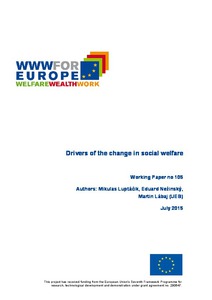Drivers of the change in social welfare
"Recent developments in the political, scientific and economic debate on the topic of the project proposal in Area 2: "The impact of ecological sustainability on growth and employment is investigated, as it will have important repercussions on econonmic policy and welfare, many of them not...
| Main Authors: | , , , |
|---|---|
| Institution: | ETUI-European Trade Union Institute |
| Format: | TEXT |
| Language: | English |
| Published: |
Vienna
2015
WWWforEurope |
| Subjects: | |
| Online Access: | https://www.labourline.org/KENTIKA-19100121124919283039-Drivers-of-the-change-in-socia.htm |
| _version_ | 1771659896538791937 |
|---|---|
| author | WWWforEurope Luptácik, Mikulas Nezinsky, Eduard Lábaj, Martin |
| author_facet | WWWforEurope Luptácik, Mikulas Nezinsky, Eduard Lábaj, Martin |
| collection | Library items |
| description | "Recent developments in the political, scientific and economic debate on the topic of the project proposal in Area 2: "The impact of ecological sustainability on growth and employment is investigated, as it will have important repercussions on econonmic policy and welfare, many of them not reflected in traditional GDP measures and in economic policy" suggest that it is of critical importance to develop and to use new approaches able to compare policy scenarios for their effectiveness, their efficiency, their enforceability and other dimensions. It is a urgent need for quantitative methodology able to assess the relative performance of different policy scenarios taking into account their long-term economic, social and environmental impacts. The methodology based on Data Envelopment Analysis (DEA) and Multi Criteria Analysis (MCA) provides a promising comparison framework. The objective of this part of research is not solely to discuss and comment on different scenario and policy outcomes provided by WP205, but to extract useful information from the phase where proposed and simulated policy scenarios are compared. In particular, we are interested in incorporating the economic, environmental and social dimensions of the positive and negative impacts of each policy scenario. As shown in the paper by Boseth-Buchner (2009) this methodology allows "to bridge the gap between the simulation phase, in which long-run efects of policies are mimicked, and the valuation phase, in which usually a coherent cost benefit analysis framework is adopted" (p. 1342). In difference to the standard application of DEA for the ex-post performance assessment in the proposed approach DEA can be used for ex-ante assessment of different policy scenarios. DEA models combined with MCA, in particular with Analytic Hierarchy Process (AHP) incorporating human judgements provides an useful instrument to analyse the impact of different policy preferences and strategies that appear to be crucial for the increasing well-being of the population. As a consequence, the proposed approach can provide a very beneficial contribution to the project as a whole and in particular to one of the central questions: "How can the EU guarantee a maximum well-being of its population?"" |
| format | TEXT |
| geographic | EU countries |
| id | 19100121124919283039_2f9ec49e7b9a4377aaaae3772c679956 |
| institution | ETUI-European Trade Union Institute |
| is_hierarchy_id | 19100121124919283039_2f9ec49e7b9a4377aaaae3772c679956 |
| is_hierarchy_title | Drivers of the change in social welfare |
| language | English |
| physical | 20 p. Digital |
| publishDate | 2015 |
| publisher | Vienna WWWforEurope |
| spellingShingle | WWWforEurope Luptácik, Mikulas Nezinsky, Eduard Lábaj, Martin economic policy EU policy sustainable development welfare state Drivers of the change in social welfare |
| thumbnail | https://www.labourline.org/Image_prev.jpg?Archive=107794692597 |
| title | Drivers of the change in social welfare |
| topic | economic policy EU policy sustainable development welfare state |
| url | https://www.labourline.org/KENTIKA-19100121124919283039-Drivers-of-the-change-in-socia.htm |

